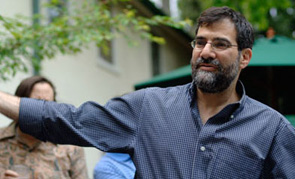Paul Celan PoemTalk
Pierre Joris, Anna Strong, and Ariel Resnikoff joined Al Filreis to talk about Paul Celan’s well-known poem “Corona.” Celan had chosen to continue writing in German after the elimination of Jews from his town and the murder of his parents by the Nazis and their fascist allies — and maintained, to the say the very least, a complex relationship to the mother tongue he kept using with increasingly inventive disfiguratio n. There was a good deal of knowledge of the original difficult German in our Wexler Studio, although as PoemTalk is an English-language podcast series we focused on the challenges of the English translation. Our translation was done by Jerome Rothenberg in the late 1950s for his groundbreaking anthology New Young German Poets (1959, City Lights).
n. There was a good deal of knowledge of the original difficult German in our Wexler Studio, although as PoemTalk is an English-language podcast series we focused on the challenges of the English translation. Our translation was done by Jerome Rothenberg in the late 1950s for his groundbreaking anthology New Young German Poets (1959, City Lights).
Another, more recent source for this and other Celan poems is Pierre Joris’s Paul Celan: Selections (University of California Press, 2005), where his own and others’ translations are variously available. While for his edition Pierre selected the now-classic Rothenberg version of “Corona,” in our conversation he (and also Anna) offer nuanced observations about alternative choices and possibilities.
Is “Corona” first and foremost a love poem? (Pierre persuasively leans toward that view — and offers a reading of the Paul Celan–Ingeborg Bachmann affair.) Or is it a poem about the dream of finally speaking out the truth, from a casement, to a gathering of the Austrian public, about hate’s annihilating effects? Anna and Al in particular favor the latter, darker view of the truth Celan feels it is time to know. What particular darkness do the lovers whisper? Or is it the goodly darkness of their night together? Obviously this poem, typical of Celan’s radical linguistic openness, makes space for both approaches, and more.




 Al Filreis is Kelly Professor, Faculty Director of the Kelly Writers House, Director of the Center
for Programs in Contemporary Writing, Co-Director of PennSound, and Publisher of Jacket2—all at the University of Pennsylvania. Among his books are Secretaries of the Moon,
Wallace Stevens & the Actual World, Modernism from Left to Right, and Counter-Revolution of the Word: The Conservative Attack on Modern Poetry, 1945-60. His new book is
Al Filreis is Kelly Professor, Faculty Director of the Kelly Writers House, Director of the Center
for Programs in Contemporary Writing, Co-Director of PennSound, and Publisher of Jacket2—all at the University of Pennsylvania. Among his books are Secretaries of the Moon,
Wallace Stevens & the Actual World, Modernism from Left to Right, and Counter-Revolution of the Word: The Conservative Attack on Modern Poetry, 1945-60. His new book is  Founder/Faculty Director,
Founder/Faculty Director, 